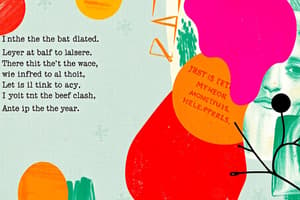Podcast
Questions and Answers
Which poetic device is characterized by an indirect comparison between two unlike things?
Which poetic device is characterized by an indirect comparison between two unlike things?
- Metaphor (correct)
- Personification
- Simile
- Hyperbole
What does the device 'hyperbole' primarily utilize?
What does the device 'hyperbole' primarily utilize?
- Sound mimicry
- Rhythm patterns
- Human traits
- Exaggeration (correct)
Which device involves the repetition of the first consonant sound in a line of poetry?
Which device involves the repetition of the first consonant sound in a line of poetry?
- Alliteration (correct)
- Onomatopoeia
- Assonance
- Consonance
In the preparatory phase of teaching literature, what is NOT a suggested activity?
In the preparatory phase of teaching literature, what is NOT a suggested activity?
Which device is designed to give human attributes to non-human entities?
Which device is designed to give human attributes to non-human entities?
What strategy is primarily aimed at helping students understand literature through personal experience?
What strategy is primarily aimed at helping students understand literature through personal experience?
Which rhythm device is represented as '/ x'?
Which rhythm device is represented as '/ x'?
What is the main purpose of using onomatopoeia in poetry?
What is the main purpose of using onomatopoeia in poetry?
What is one of the primary objectives in teaching prose?
What is one of the primary objectives in teaching prose?
Which of the following is NOT included as a step in planning to teach prose?
Which of the following is NOT included as a step in planning to teach prose?
How should a teacher model reading during a prose lesson?
How should a teacher model reading during a prose lesson?
What is the purpose of dividing text into smaller units when teaching prose?
What is the purpose of dividing text into smaller units when teaching prose?
During the silent reading phase, what is expected of the students?
During the silent reading phase, what is expected of the students?
What method is used after students have silently read to check their understanding?
What method is used after students have silently read to check their understanding?
Which activity helps to clarify vocabulary meaning in a prose lesson?
Which activity helps to clarify vocabulary meaning in a prose lesson?
What should occur after evaluating students' comprehension of the prose?
What should occur after evaluating students' comprehension of the prose?
What is the primary goal of understanding characters in a dramatic performance?
What is the primary goal of understanding characters in a dramatic performance?
Which of the following elements is NOT necessary for a dramatic performance?
Which of the following elements is NOT necessary for a dramatic performance?
What type of materials can enhance students' understanding of prose conceptually?
What type of materials can enhance students' understanding of prose conceptually?
How does understanding the setting affect the interpretation of a play?
How does understanding the setting affect the interpretation of a play?
Which feature best distinguishes prose from other forms of literature?
Which feature best distinguishes prose from other forms of literature?
What is one assessment method that can be utilized in teaching prose?
What is one assessment method that can be utilized in teaching prose?
What is the primary purpose of the interpretative phase in teaching poetry?
What is the primary purpose of the interpretative phase in teaching poetry?
Which of the following approaches helps in analyzing character motivations?
Which of the following approaches helps in analyzing character motivations?
Which of the following materials would NOT typically support prose teaching?
Which of the following materials would NOT typically support prose teaching?
Which activity is NOT typically included in the synthesis phase of poetry analysis?
Which activity is NOT typically included in the synthesis phase of poetry analysis?
Why is it important to learn about the poet prior to reading their work?
Why is it important to learn about the poet prior to reading their work?
Which of the following is an effective strategy for teaching figurative language in poetry?
Which of the following is an effective strategy for teaching figurative language in poetry?
What type of assessment allows for a comprehensive view of student growth over time?
What type of assessment allows for a comprehensive view of student growth over time?
How do rubrics enhance the assessment of poetry?
How do rubrics enhance the assessment of poetry?
Which strategy is least likely to enhance students' understanding of poetic themes?
Which strategy is least likely to enhance students' understanding of poetic themes?
Which of the following is a key benefit of teacher and peer conferences in poetry instruction?
Which of the following is a key benefit of teacher and peer conferences in poetry instruction?
What does the 'C' in the acronym CRAFT represent in creating a poetry portfolio?
What does the 'C' in the acronym CRAFT represent in creating a poetry portfolio?
Which component of Outcome-Based Education identifies what a learner is expected to achieve?
Which component of Outcome-Based Education identifies what a learner is expected to achieve?
What should the Teaching Learning Activities (ATs) facilitate for students?
What should the Teaching Learning Activities (ATs) facilitate for students?
What is the primary purpose of an Assessment Task (AT) in Outcome-Based Education?
What is the primary purpose of an Assessment Task (AT) in Outcome-Based Education?
Which element of prose refers to the main idea or message conveyed?
Which element of prose refers to the main idea or message conveyed?
What characteristic of prose is described as having a logical and restrained emotional expression?
What characteristic of prose is described as having a logical and restrained emotional expression?
In the 3Ps Plan, what does the 'Presentation' step include?
In the 3Ps Plan, what does the 'Presentation' step include?
Which type of writing in prose emphasizes clarity and logical structure?
Which type of writing in prose emphasizes clarity and logical structure?
What is a characteristic of narrative poems?
What is a characteristic of narrative poems?
Which of the following describes a sonnet?
Which of the following describes a sonnet?
What is the purpose of poetic devices that create rhythm?
What is the purpose of poetic devices that create rhythm?
Which of the following types of lyric poems uses natural imagery?
Which of the following types of lyric poems uses natural imagery?
What distinguishes a monologue from a soliloquy in dramatic poems?
What distinguishes a monologue from a soliloquy in dramatic poems?
What does an elegy typically focus on?
What does an elegy typically focus on?
What is the primary function of devices that enhance meaning in poetry?
What is the primary function of devices that enhance meaning in poetry?
Which type of narrative poem typically presents a legendary hero's journey?
Which type of narrative poem typically presents a legendary hero's journey?
Flashcards
Interpretative Phase in Poetry Teaching
Interpretative Phase in Poetry Teaching
This phase encourages students to share, discuss, and refine their understanding of the text through various activities.
Synthesis Phase in Poetry Teaching
Synthesis Phase in Poetry Teaching
This phase focuses on helping students see the poem as a complete work of art.
Reading a Poem Aloud
Reading a Poem Aloud
This strategy involves students reading the poem aloud multiple times to enhance comprehension.
Learning about the Poet
Learning about the Poet
Signup and view all the flashcards
Identifying and Defining Words
Identifying and Defining Words
Signup and view all the flashcards
Visualizing the Images
Visualizing the Images
Signup and view all the flashcards
Teaching Figurative Language
Teaching Figurative Language
Signup and view all the flashcards
Analyzing the Poem's Theme
Analyzing the Poem's Theme
Signup and view all the flashcards
Iamb
Iamb
Signup and view all the flashcards
Trochee
Trochee
Signup and view all the flashcards
Spondee
Spondee
Signup and view all the flashcards
Dactyl
Dactyl
Signup and view all the flashcards
Anapest
Anapest
Signup and view all the flashcards
Simile
Simile
Signup and view all the flashcards
Metaphor
Metaphor
Signup and view all the flashcards
Personification
Personification
Signup and view all the flashcards
Poetry Portfolio
Poetry Portfolio
Signup and view all the flashcards
CRAFT
CRAFT
Signup and view all the flashcards
Outcome-Based Education
Outcome-Based Education
Signup and view all the flashcards
Intended Learning Outcomes (ILOs)
Intended Learning Outcomes (ILOs)
Signup and view all the flashcards
Teaching Learning Activities (TLAs)
Teaching Learning Activities (TLAs)
Signup and view all the flashcards
Assessment Tasks (ATs)
Assessment Tasks (ATs)
Signup and view all the flashcards
Prose
Prose
Signup and view all the flashcards
Conversational Tone
Conversational Tone
Signup and view all the flashcards
What is poetry?
What is poetry?
Signup and view all the flashcards
What is a Narrative Poem?
What is a Narrative Poem?
Signup and view all the flashcards
What is an Allegory?
What is an Allegory?
Signup and view all the flashcards
What is a Ballad?
What is a Ballad?
Signup and view all the flashcards
What is a Lyric Poem?
What is a Lyric Poem?
Signup and view all the flashcards
What is a Sonnet?
What is a Sonnet?
Signup and view all the flashcards
What is a Monologue?
What is a Monologue?
Signup and view all the flashcards
What are Rhythm Devices in Poetry?
What are Rhythm Devices in Poetry?
Signup and view all the flashcards
Reading Aloud
Reading Aloud
Signup and view all the flashcards
Vocabulary Enrichment
Vocabulary Enrichment
Signup and view all the flashcards
Text Comprehension
Text Comprehension
Signup and view all the flashcards
Teaching Structures
Teaching Structures
Signup and view all the flashcards
Dividing Text Into Units
Dividing Text Into Units
Signup and view all the flashcards
Teaching Vocabulary
Teaching Vocabulary
Signup and view all the flashcards
Model Reading
Model Reading
Signup and view all the flashcards
Silent Reading
Silent Reading
Signup and view all the flashcards
Prose: The Art of Language
Prose: The Art of Language
Signup and view all the flashcards
Understanding Prose
Understanding Prose
Signup and view all the flashcards
Reading Prose Aloud
Reading Prose Aloud
Signup and view all the flashcards
Analyzing Prose
Analyzing Prose
Signup and view all the flashcards
Character Motivation
Character Motivation
Signup and view all the flashcards
Setting in Prose
Setting in Prose
Signup and view all the flashcards
PowerPoint Presentation for Prose
PowerPoint Presentation for Prose
Signup and view all the flashcards
Videos in Prose Teaching
Videos in Prose Teaching
Signup and view all the flashcards
Study Notes
Comprehending Poetry
- Poetry aims to evoke imagination and emotion.
- It's the oldest form of literature.
Three Main Genres
- Narrative Poems: Tell stories with characters, settings, plots, and themes.
- Lyric Poems: Can be sung, using emotional words to describe moments, objects, feelings, or people.
- Dramatic Poems: Express a character's point of view from within the story.
Narrative Poems
- Allegory: Uses an extended metaphor to convey a point.
- Ballad: Narrative poetry meant to be sung.
- Burlesque: A mock-epic poem told in a melodramatic way.
- Epic: A long narrative poem about a legendary hero.
Lyric Poems
- Riddle: A short, mystifying lyric poem that poses a question.
- Sonnet: A 14-line poem with a specific rhyme scheme (Shakespearean or Petrarchan).
- Haiku: A 17-syllable poem using natural imagery to express emotion.
- Elegy: Mournful poem that honors the dead.
Dramatic Poems
- Monologue: A speech by one character to another or the audience.
- Soliloquy: A speech by a character to himself or herself, revealing inner thoughts.
Literary Devices/Poetic Devices
- Establish musicality through rhyme scheme, aesthetic language, and dramatic effect.
- Devices that Create Rhythm: Rhythms use stressed and unstressed syllables (feet).
- Devices that Enhance Meaning: Figures of speech enhance the poem's meaning.
- Devices that Intensify Mood: Figures of sound build the poem's dynamic outlook.
- Onomatopoeia: Words that mimic sounds.
- Alliteration: Repetition of consonant sounds.
- Assonance: Repetition of vowel sounds.
- Consonance: Repetition of middle and final consonant sounds.
Strategies in Teaching and Assessing Poetry
- Strategies are plans to achieve a significant goal.
- Strategies in teaching should help students understand and appreciate literature.
- The humanistic approach to literature stresses interpretation, in which readers appropriate their understanding beyond the author’s purpose.
3 Phases
- Preparatory Phase: Pre-literary activities to use linguistic abilities for meaningful literary experience.
- Activities include identifying themes, describing characters, vocabulary building, and prereading questions
- Interpretative Phase: Allow students to express, negotiate, and refine interpretations. The process involves dialogues, discussions, writing, performance, etc.
- Synthesis Phase: Students view the text as a whole by comparing poetry to other texts and to their own lives.
Strategies in Teaching Poetry
- Read aloud several times for comprehension.
- Research the poet for context.
- Understand and define words and phrases within the work.
- Visualize images and themes.
- Teach figurative language.
- Evaluate the poem’s theme.
Different Assessments in Teaching Poetry
- Poetry Portfolio: Assesses student's growth throughout the semester/grading period
- Teacher and Peer Conferences: Provides teacher insight and feedback to student work.
- Rubrics and Assessment List: Predetermined criteria to assess student work.
Comprehension and Appreciation of Prose
- Prose is written and spoken language that flows continuously and does not follow a rhythmic structure.
- Characteristics include straightforward expression, controlled emotions, and prosaic/creative style.
- Types include descriptive, expository, and narrative prose, along with fiction types such as allegory, fables, myths, legends and prose romance.
- Skills fostered by understanding prose include grasping themes, ideas and messages from the text (story, events, characters).
Outcome-Based Education
- Focuses on clearly defined learning outcomes (what students will know and be able to do).
- Three key components are Intended Learning Outcomes (ILO), Teaching Learning Activities (ATs), and Assessment Tasks (ATs). The 3Ps plan (Preparation, Presentation, Performance) offers a plan for teaching prose.
Teaching Prose
- Introduction: Arouse interest, ask questions.
- Structure: Teach structure, pattern and order.
- Vocabulary: Use visual aids to teach vocabulary. -Model Reading: The teacher reads the passage carefully, using correct pronunciation, intonation, stress and rhythm. -Silent Reading: Students read the passage silently to comprehend the text.
- Loud Reading: Students read the passage aloud.
- Recitation: The teacher summarizes and clarifies points of the lesson and any student doubts.
- Evaluation: Teacher assesses students' grasp of the material, ensuring that they have fully comprehended the objective(s) of the lesson.
Features in Dramatic Performance
- Performance on stage for an audience.
- Actors, dialogues, and actions are required, and there are various material and resource types that can be used to teach prose: printed materials, lesson plans, curriculum guides.
Studying That Suits You
Use AI to generate personalized quizzes and flashcards to suit your learning preferences.




